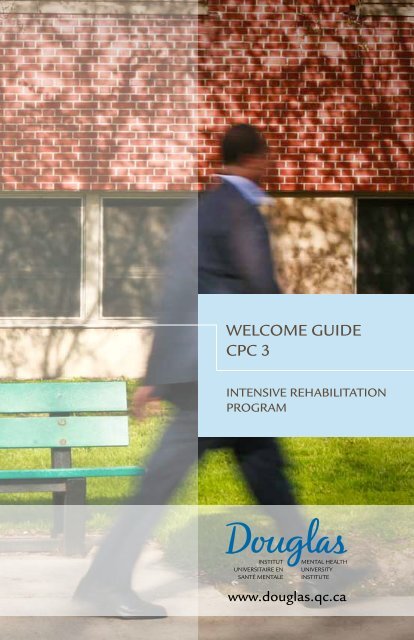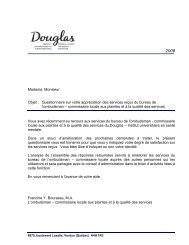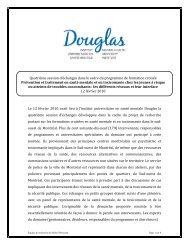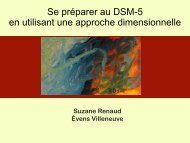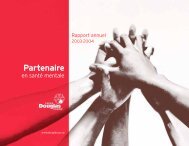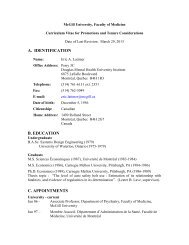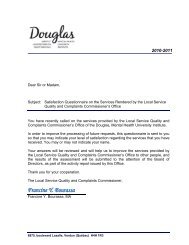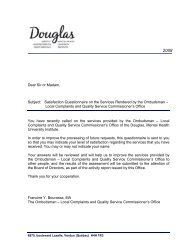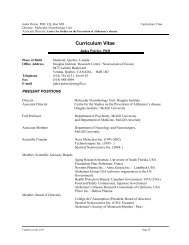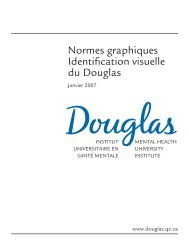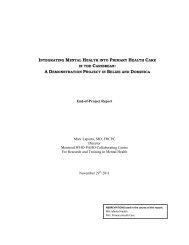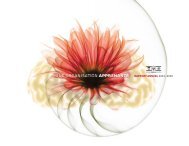WELCOME GUIDE CPC 3
WELCOME GUIDE CPC 3
WELCOME GUIDE CPC 3
Create successful ePaper yourself
Turn your PDF publications into a flip-book with our unique Google optimized e-Paper software.
WelcomeOn behalf of the entire treatment team, welcome to the IntensiveRehabilitation Program on <strong>CPC</strong> 3. The goal of this program is to improve yourquality of life by helping you live a more satisfying and productive life.The members of the treatment teamwill work directly with you to develop apersonalized rehabilitation plan. Thisrehabilitation plan is based on a thoroughassessment of your skills and strengths, andserves as a blueprint enabling you to have asuccessful return to the community.This manual is yours to keep. It containsvaluable information that you will finduseful during your stay on <strong>CPC</strong> 3. Weare committed to providing a safe, nonthreateningenvironment that is conduciveto change, where you will learn/re-learnthe skills necessary to prepare you forreintegration into the community.
TreatmentteamWhen you arrive on <strong>CPC</strong> 3 and throughout your stay, you will undergo aprocess of assessment. The assessments serve to develop your rehabilitationplan, to monitor your progress, and to determine when you are ready toreintegrate into the community. These evaluations take many forms: staffobservations, data from individual and group meetings, and questionnairescompleted by both you and staff members.The treatment team responsible for managing the services you will receive whileon <strong>CPC</strong> 3 is made up of:• a primary nurse or primarynursing assistant• a psychologist• a social worker• a rehabilitation assistant• a psychiatrist• a behaviour modificationagent• a teacher• staff members from otherdisciplines, based on yourneedsThe treatment team will meet with you regularly to discuss your rehabilitationplan, review your progress, and discuss any changes. The primary nurse ornursing assistant has a very specific role. This person is responsible for ensuringthat your Individualized Intervention Plan (IIP) is developed, carried out, andrevised regularly. Additionally, this person is available throughout your stayon <strong>CPC</strong> 3 to answer any questions or concerns you may have about yourrehabilitation plan.
ProgramcomponentsDaily living skills• Budgeting (individual)• Focus on you• Hygiene and room care• Cooking classes• Classes on washing andmaintaining clothes• Travel training usingpublic transitRecreational and leisureactivities• Movie group• Bingo• Recreation center• GreenhousePsychosocial therapy groups• Cognitive behaviouraltherapy• Community reinsertion• Symptom management• Medication management• Substance abuse• Interpersonal problemsolving• Self-esteem• Cognitive remediation• Motivational interviewing• Educational and academicWeekly community meetingEvery Monday at 9:45 a.m. Yourattendance is essential.Individual sessionsIn addition to the groups and classesoffered, you will participate inindividual sessions. These individualsessions may take many forms(based on your needs) includingpsychological counseling, specifictherapies or interviews with yourprimary nurse or nursing assistant.
GeneralUnit rulesHygiene and room careTaking care of your personal hygieneand room is very important. Giventhe number of clients on the Unit,and the limited facilities, you will beassigned either a morning or eveningbath/shower time. It is important torespect your schedule.MedicationMedication is generally dispensed atthe following times:8:00 - 8:30 a.m.11:30 a.m. - noon4:30 - 5:00 p.m.8:30 - 9:15 p.m.It is possible that you will beapproached to participate in the selfmedicationprogram.Behaviourmanagement programAs needed, a behaviour managementprogram will be used to help youdevelop, maintain and practiceappropriate behaviours and skillsthat will enable you to return intothe community.MealsBreakfast 8:00 - 8:30 a.m.Lunch noon - 12:30 p.m.Dinner 5:00 - 6:00 p.m.Snacks 10:00 - 10:15 a.m.3:00 - 3:15 p.m.8:00 - 8:30 p.m.It is important to arrive on time.Food and drinksDrinks and food are not acceptedanywhere other than the diningroom. The Unit reserves the rightto refuse to store food and drinksbrought by visitors.CurfewFor those who have the right to gooff the Unit on hospital grounds orin the city, the curfew is 9:00 p.m.If you have to return after 9:00 p.m.(special outings) you must discussthis with your nurse beforehand.This will be documented on theappropriate form.BedtimeBedtime is 11:00 p.m. Appropriatenightwear must be worn.
SmokingSmoking is not permitted insidethe Institute, including Café Oasisand Dalse Snack Bar. On the Unit,smoking is permitted in the smokingroom only (room A-3143).For those requiring managementof their cigarettes, they are givenout between 7:00 a.m. - 9:00 p.m.according to the posted schedule.Self-management of cigarettes isa decision that will be made incollaboration with your treatmentteam. Matches and lighters MUSTbe handed in to the nursing stationbefore bedtime. This is a securitymeasure required by the Institute.By law, when you smoke outside,you must be at least 9 meters fromthe Institute buildings. The smokingroom is reserved for clients of<strong>CPC</strong> 3 only. Visitors and staffmembers are not permitted to usethe smoking room. Please use thesmoking room for smoking only, foodand beverages are not permitted.Please keep the smoking room cleanand use the ashtrays at your disposal.primary nurse to establish a budgetcontingent upon the funds you haveavailable, and your rehabilitationplan. The goal is not to controlyour money, but rather to assist youin learning to effectively manageyour funds.The purchase of special items (otherthan your usual expenditures) mustbe planned in collaboration withyour primary nurse or primarynursing assistant.To ensure your safetyUpon admission, you will be asked towear an identification bracelet or haveyour picture taken so that the staffwill be able to identify you at all times.This ensures that you will receivethe appropriate treatment that hasbeen prescribed for you (such as yourmedication). In case of an emergency,we may be required to contact yourfamily or someone close to you. Underother conditions, we will respectyour decision with regard to ourcommunications with family membersor friends.MoneyYour funds will be safeguarded inan account at the Douglas Institutepatients’ bank, located in PerryPavilion, Room E-1152. You willwork in collaboration with your
STAYINGCONNECTEDVisiting HoursMonday toFridaySaturday andSunday10:00 a.m. -8:00 p.m.10:00 a.m. -8:00 p.m.You must plan your visits with yourfamily and friends based on yourscheduled activities. Please adviseyour visitors that they must checkin at the nursing station (roomA-3103) upon their arrival. Pleasebe advised that staff reserve theright to ask visitors to leave the Unitshould circumstances justify it.Exceptions to these hours can bemade in collaboration with yourprimary nurse or primary nursingassistant.TelephoneThere is a telephone available forthe clients. It is in function 7 daysa week, from 8:00 a.m. - 9:00 p.m.It is located in a small room (roomA-3101) opposite the nursingstation. This telephone is equippedto make and receive calls. Thetelephone number is 514 761-6131,extension 3860. People wanting tocommunicate with you must usethis number and not the nursingstation number.Please keep your calls brief, as this isthe only telephone available to theclients on the Unit. If you answer thetelephone, please assist the otherclients by finding them and advisingthem they have a call. Please notethat there is no charge for makinglocal calls. If you want to make along distance call, arrangementscan be made with your primarynurse or primary nursing assistant,or a member of your treatmentteam. You will be charged (fundsdebited from your account) for longdistance calls.
R-E-S-P-E-C-TLiving in an environment with 31clients and the presence of staffmembers can present certainchallenges. Applying the principalof “do unto others as you wouldhave them do onto you” helps makethe environment more pleasurablefor all. For example, verbal andphysical abuse will not be tolerated.We ask you to respect the physicalenvironment and to keep it cleanand orderly.The Douglas Institute Code of Ethics isposted opposite the nursing station.It explains the client’s rights andresponsibilities, and the conduct tobe followed by the staff. Anotherdocument entitled Restrictive Measuresand Exceptional Measures is postedalongside the Code of Ethics. Pleasetake the time to familiarize yourselfwith these two documents.If you require any further informationabout your rights and responsibilities,the Complaints Commissioner canbe contacted at 514 761-6131,extension 3287. The Beneficiaries’Committee may also provide youwith helpful information and canbe reached at 514 761-6131,extension 2273.<strong>CPC</strong> 3 Code of civilityWe will not accept a lack of:• Respect• Collaboration• Politeness• Courtesy• Good mannersAbusive language, gestures and actionsseen as degrading or done with intentto harm will not be tolerated.Management of stolen, lostor damaged objects andpersonal effectsThe Douglas Institute is a publicinstitution. Many people walkthrough its doors every day. Forthis reason, the Institute asks itspatients, their families and friendsto hand over all objects, monies orexpensive clothing to people whomthey trust in order to protect thesearticles from damage, loss or theft.The Institute doesn’t assume anyresponsibility for the damage, loss,or theft of any personal effectsthat a patient had in his possessionduring a visit to one of our buildings/pavilions or had kept with himduring his stay at the Institute.
Once again, on behalfof the entire treatmentteam, welcome to <strong>CPC</strong>3. It is our pleasure towork side by side withyou throughout yourrehabilitation plan andsuccessful re-integrationinto the community.


